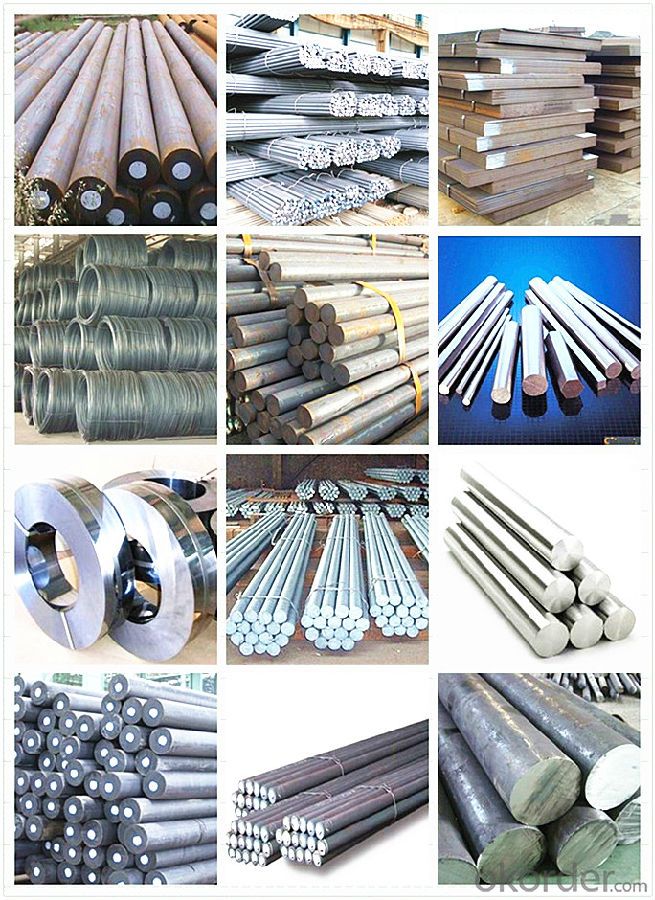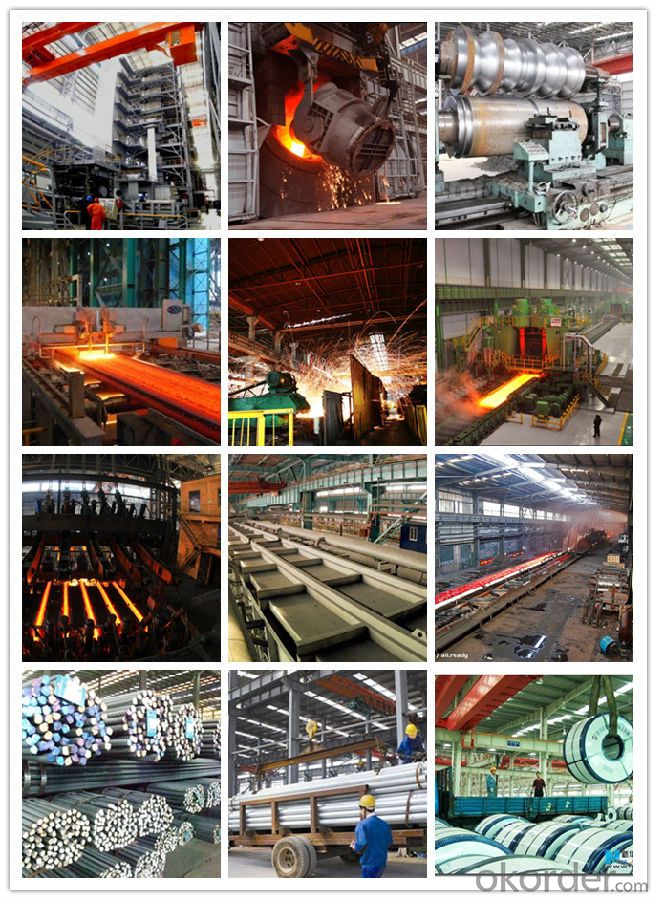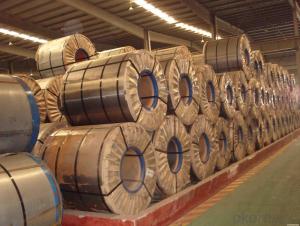Special Steel 65Mn Hot Rolled Spring Steel
- Loading Port:
- China main port
- Payment Terms:
- TT OR LC
- Min Order Qty:
- 30 m.t.
- Supply Capability:
- 10000 m.t./month
OKorder Service Pledge
OKorder Financial Service
You Might Also Like
Item specifice
Product information:
Description of goods: | |
Standard | JIS/DIN/ASTM/SUS/AISI/EN/GB...... |
Material | 201/202/216/304/316/309S/310/410/430...... |
Width | 600-3300mm |
Thickness | 2-120mm |
Length | 1000-6000mm, or as the clients' requests |
Technology | Hot rolled |
Tolerance | Control with in the standard |
Advantages | 1.Short delivery time |
2.Quality assurance | |
3.Competitive price | |
4.Superior Service | |
Packing: | |
1. Export sea worthy package + water proof paper + wooden pallet 2. Max Loading 26.5mt for each 20Gp container 3. Safe loading and fixing Professional Teams 4. Professional shipping line | |
Product Show:

Workshop Show:

Shipping
1. FedEx/DHL/UPS/TNT for samples, Door-to-Door;
2. By Air or by Sea for batch goods, for FCL; Airport/ Port receiving;
3. Customers specifying freight forwarders or negotiable shipping methods!
Delivery Time: 3-7 days for samples; 5-25 days for batch goods.
Payment Terms
1.Payment: T/T, L/C, Western Union, MoneyGram,PayPal; 30% deposits; 70% balance before delivery.
2.MOQ: 1pcs
3.Warranty : 3 years
4.Package Informations: 1) EXPORT, In 20 feet (GW 25 ton) or 40 feet Container (GW 25 ton)
2)as customer's requirement
Why choose us?
(1) The leading exporter in China special steel industry.
(2) Large stocks for various sizes, fast delivery date.
(3) Good business relationship with China famous factories.
(4) More than 7 years steel exporting experience.
(5) Good after-sales service guarantee.
- Q:What are the main applications of special steel in the chemical processing industry?
- Special steel is widely used in the chemical processing industry due to its exceptional properties such as corrosion resistance, high strength, and heat resistance. It finds applications in various components and equipment such as reactors, heat exchangers, pipes, valves, and fittings. These materials are crucial for handling corrosive chemicals, withstanding high temperatures and pressures, and ensuring the integrity and safety of chemical processing operations.
- Q:What are the different heat treatment processes used for special steel?
- Some of the different heat treatment processes used for special steel include annealing, tempering, quenching, and hardening.
- Q:How is high-strength tool steel used in the production of heavy-duty tools?
- High-strength tool steel is used in the production of heavy-duty tools due to its exceptional hardness, toughness, and wear resistance properties. Its high strength allows heavy-duty tools to withstand intense forces and impacts without deforming or breaking. Additionally, the superior wear resistance of tool steel ensures that the tools retain their sharpness and cutting edge for extended periods, making them ideal for demanding applications such as machining, drilling, and shaping hard materials. Overall, the use of high-strength tool steel enhances the durability and performance of heavy-duty tools, enabling them to withstand rigorous use and provide reliable results.
- Q:What are the different forming processes for special steel?
- There are several forming processes for special steel, including hot forming, cold forming, and powder metallurgy. Hot forming involves heating the steel to a high temperature and then shaping it through processes like forging or rolling. Cold forming, on the other hand, involves shaping the steel at room temperature using processes like bending or extrusion. Powder metallurgy involves compacting metal powders and then sintering them to create a solid piece. These forming processes allow for the production of special steel with unique properties and shapes to meet various industrial needs.
- Q:How does the composition of special steel affect its mechanical properties?
- The mechanical properties of special steel are significantly influenced by its composition. Special steel refers to a type of steel that has been altered or mixed with other elements to enhance its strength, toughness, hardness, and other desirable properties. The mechanical properties of special steel can be greatly affected by the addition of various alloying elements, such as manganese, chromium, nickel, molybdenum, vanadium, and tungsten. For instance, the inclusion of chromium can enhance corrosion resistance and hardness, making the steel more suitable for use in harsh environments. Manganese is often added to improve the steel's hardenability and tensile strength. Nickel can increase toughness and strength while maintaining good ductility. The specific mechanical properties of special steel can be achieved by adjusting the amount and combination of these alloying elements. For example, increasing the carbon content can boost the steel's strength and hardness, but it may reduce its ductility. Conversely, reducing the carbon content and introducing elements like nickel and molybdenum can enhance the steel's toughness and resistance to impacts. Moreover, the heat treatment process is crucial in influencing the mechanical properties of special steel. Techniques like quenching and tempering allow for the manipulation of the steel's microstructure to attain desired properties. Quenching involves rapidly cooling the steel to achieve high hardness and strength, while tempering helps reduce brittleness and improve toughness. In conclusion, the mechanical properties of special steel are determined by its composition, including the type and quantity of alloying elements, as well as the heat treatment process. By carefully selecting and controlling these factors, manufacturers can customize special steel to meet specific performance requirements for a wide range of applications.
- Q:How does special steel perform in terms of creep resistance at elevated temperatures?
- Special steel has excellent creep resistance at elevated temperatures. Its unique composition and heat treatment processes enable it to maintain its strength and dimensional stability over prolonged periods of exposure to high temperatures. This makes special steel highly reliable and suitable for applications where resistance to creep deformation is crucial, such as in power generation plants, aerospace, and oil and gas industries.
- Q:How are tungsten alloys used in the defense industry?
- Tungsten alloys are utilized in the defense industry due to their exceptional strength, density, and high melting point. These alloys are commonly used in armor-piercing projectiles, as well as in the manufacturing of armor plates and shields for military vehicles and aircraft. Furthermore, tungsten alloys are employed in the production of various defense components, such as munitions, missile parts, and penetrators, due to their ability to withstand extreme conditions and offer superior performance in critical defense applications.
- Q:How does special steel perform in high-temperature corrosion resistance?
- Special steel is known for its excellent performance in high-temperature corrosion resistance. It is specifically designed to withstand harsh conditions and maintain its integrity even at elevated temperatures. The composition of special steel includes various alloying elements such as chromium, nickel, molybdenum, and others, which enhance its resistance to corrosion in high-temperature environments. At high temperatures, many materials tend to oxidize or react with the surrounding environment, leading to corrosion and degradation. However, special steel forms a protective oxide layer on its surface, which acts as a barrier against corrosive elements. This oxide layer, mainly composed of chromium, is stable and self-repairing, preventing further corrosion and maintaining the structural integrity of the steel. Furthermore, the addition of alloying elements like molybdenum improves the steel's resistance to pitting and crevice corrosion, which are common in high-temperature environments. Special steel also exhibits excellent mechanical properties even at elevated temperatures, ensuring its structural stability and preventing deformation or failure under stress. Additionally, special steel is often heat-treated to enhance its high-temperature corrosion resistance. Heat treatment processes like annealing, tempering, or quenching and tempering optimize the microstructure and mechanical properties of the steel, making it more resistant to corrosion in extreme conditions. Overall, special steel performs exceptionally well in high-temperature corrosion resistance due to its unique composition, protective oxide layer, and heat treatment processes. It is a reliable and durable material choice for applications that involve exposure to elevated temperatures and corrosive environments, such as in chemical processing plants, power generation facilities, or oil and gas refineries.
- Q:What are the specific requirements for special steel used in nuclear applications?
- Special steel used in nuclear applications has specific requirements to ensure its suitability and safety within the highly demanding and sensitive nuclear environment. These requirements are designed to guarantee the integrity and performance of the steel in various conditions, including extreme temperatures, radiation exposure, and corrosive environments. One of the primary requirements for special steel used in nuclear applications is high strength and toughness. The steel must possess excellent mechanical properties to withstand the immense pressure and stress that it will experience during operation. This enables the steel to resist deformation, cracking, and failure, ensuring the structural integrity of nuclear components. Another crucial requirement is the ability to withstand high temperatures and thermal cycling. Nuclear reactors operate at elevated temperatures, and the steel must retain its mechanical properties even under extreme thermal conditions. This prevents any degradation or loss of strength that could compromise the safety and efficiency of the nuclear system. Furthermore, special steel used in nuclear applications must exhibit exceptional resistance to corrosion and oxidation. The nuclear environment can be highly corrosive due to the presence of various chemicals and coolants, such as water, steam, and coolant gases. The steel must possess a high level of corrosion resistance to prevent any degradation or material loss, which could lead to leaks or failures. Radiation resistance is also a critical requirement for special steel used in nuclear applications. Nuclear reactors emit ionizing radiation, which can damage the structure and properties of conventional materials. Therefore, the steel must have a high resistance to radiation-induced embrittlement and degradation, ensuring its long-term performance in a radioactive environment. Additionally, the steel used in nuclear applications must comply with strict quality control and certification standards. These standards ensure the steel's traceability, material composition, and manufacturing processes, guaranteeing its reliability and compliance with regulatory requirements. Quality control measures include non-destructive testing, ultrasonic examinations, and material certification. Overall, the specific requirements for special steel used in nuclear applications encompass high strength, toughness, thermal stability, corrosion resistance, radiation resistance, and adherence to stringent quality control standards. Meeting these requirements is crucial to ensure the safe and reliable operation of nuclear systems while mitigating potential risks associated with the nuclear environment.
- Q:How does special steel contribute to the overall strength and durability of structures?
- Several factors contribute to the overall strength and durability of structures, and special steel is one such factor. Firstly, the manufacturing process of special steel involves incorporating specific alloying elements that enhance its mechanical properties. This leads to an increase in tensile strength and hardness, enabling the steel to withstand higher loads and pressures. Consequently, the structural integrity of buildings and infrastructures is ensured. Additionally, special steel is renowned for its remarkable resistance against corrosion. This is particularly significant for structures that are exposed to harsh environmental conditions or come into contact with corrosive substances. By preventing rust and degradation, special steel significantly prolongs the lifespan of structures. As a result, maintenance costs are reduced, and the need for frequent repairs or replacements is minimized. Furthermore, the unique properties of special steel enable the creation of streamlined and lightweight structures. Its high strength-to-weight ratio empowers architects and engineers to design structures with thinner sections and reduced material usage, all while maintaining the necessary strength. This not only saves costs but also reduces the environmental impact associated with construction. Moreover, special steel exhibits exceptional toughness and impact resistance. This makes it highly resistant to fractures or buckling when subjected to extreme loads or dynamic forces. This property is particularly crucial for structures that face seismic events, heavy vibrations, or impacts, as it guarantees the safety and stability of the building or infrastructure. In conclusion, special steel plays a critical role in enhancing the overall strength and durability of structures. Its unique mechanical properties, corrosion resistance, lightweight nature, and high toughness all contribute to the longevity, safety, and cost-effectiveness of buildings and infrastructures.
1. Manufacturer Overview |
|
|---|---|
| Location | |
| Year Established | |
| Annual Output Value | |
| Main Markets | |
| Company Certifications | |
2. Manufacturer Certificates |
|
|---|---|
| a) Certification Name | |
| Range | |
| Reference | |
| Validity Period | |
3. Manufacturer Capability |
|
|---|---|
| a)Trade Capacity | |
| Nearest Port | |
| Export Percentage | |
| No.of Employees in Trade Department | |
| Language Spoken: | |
| b)Factory Information | |
| Factory Size: | |
| No. of Production Lines | |
| Contract Manufacturing | |
| Product Price Range | |
Send your message to us
Special Steel 65Mn Hot Rolled Spring Steel
- Loading Port:
- China main port
- Payment Terms:
- TT OR LC
- Min Order Qty:
- 30 m.t.
- Supply Capability:
- 10000 m.t./month
OKorder Service Pledge
OKorder Financial Service
Similar products
New products
Hot products
Hot Searches
Related keywords






























